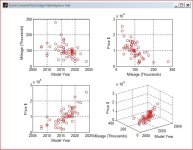- Joined
- Sep 6, 2011
- Messages
- 12,157
- Location
- Philadelphia
- Tractor
- John Deere 3033R, 855 MFWD, 757 ZTrak; IH Cub Cadet 123
Hi folks,
Nothing to do with tractors, but with a wide and varied group here, I'm guessing there are a few who could offer me some advice here.
I implemented an ERP system for a small manufacturing business in Excel, a collection of about a dozen spreadsheets with error checking and a huge array of interdependencies. Some are simple match / lookup, but more are complicated operations based on finding data in other sheets. It all works great, but the latest versions of Excel are consistently breaking it with poorly-implemented autocorrect features, and of course it can only ever be accessed by one person at a time. It's also very prone to a user hosing the whole thing up by accident.
It's time to convert it to a database, but the only databases I've ever personally coded / created from scratch were all in MS Access. I'm not sure that dozens of hours put into recreating this ERP system in Access would be the best investment, but I don't know.
Of course there are canned ERP systems I could buy, but the cheap ones are very limited, and this operation is too small to invest in a big enterprise level solution and the investment that maintaining those usually entails. A fully-customized system in a very user-friendly database such as Access does seem to fit the bill.
Maximum users will likely remain under 10 for at least several years to come, and number of records (items < 5000, BOM's < 500, transactions < 20,000) isn't exacty huge, but it is sufficient to slow down Excel with the constant cross-referencing.
Go Access, or find and learn a better option?
Nothing to do with tractors, but with a wide and varied group here, I'm guessing there are a few who could offer me some advice here.
I implemented an ERP system for a small manufacturing business in Excel, a collection of about a dozen spreadsheets with error checking and a huge array of interdependencies. Some are simple match / lookup, but more are complicated operations based on finding data in other sheets. It all works great, but the latest versions of Excel are consistently breaking it with poorly-implemented autocorrect features, and of course it can only ever be accessed by one person at a time. It's also very prone to a user hosing the whole thing up by accident.
It's time to convert it to a database, but the only databases I've ever personally coded / created from scratch were all in MS Access. I'm not sure that dozens of hours put into recreating this ERP system in Access would be the best investment, but I don't know.
Of course there are canned ERP systems I could buy, but the cheap ones are very limited, and this operation is too small to invest in a big enterprise level solution and the investment that maintaining those usually entails. A fully-customized system in a very user-friendly database such as Access does seem to fit the bill.
Maximum users will likely remain under 10 for at least several years to come, and number of records (items < 5000, BOM's < 500, transactions < 20,000) isn't exacty huge, but it is sufficient to slow down Excel with the constant cross-referencing.
Go Access, or find and learn a better option?


